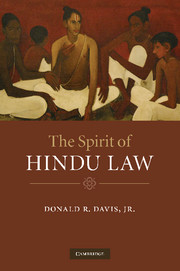Book contents
- Frontmatter
- Contents
- List of tables
- Preface
- Acknowledgments
- List of abbreviations
- Introduction (dharmaśāstra)
- 1 Sources and theologies (pramāṇa)
- 2 Hermeneutics and ethics (mīmāṃsā)
- 3 Debt and meaning (ṛṇa)
- 4 Persons and things (svatva)
- 5 Doubts and disputes (vyavahāra)
- 6 Rectitude and rehabilitation (daṇḍa)
- 7 Law and practice (ācāra)
- Conclusion
- Bibliography
- Index
Conclusion
Published online by Cambridge University Press: 26 February 2010
- Frontmatter
- Contents
- List of tables
- Preface
- Acknowledgments
- List of abbreviations
- Introduction (dharmaśāstra)
- 1 Sources and theologies (pramāṇa)
- 2 Hermeneutics and ethics (mīmāṃsā)
- 3 Debt and meaning (ṛṇa)
- 4 Persons and things (svatva)
- 5 Doubts and disputes (vyavahāra)
- 6 Rectitude and rehabilitation (daṇḍa)
- 7 Law and practice (ācāra)
- Conclusion
- Bibliography
- Index
Summary
Comparison exposes us to the mistrust born of similarity without familiarity. The dangers and fears involved in discovering similarities that are not yet familiar lie at the root of tremendous human suffering. Similarity undermines hierarchy and discrimination; it thwarts power by exposing the weaknesses of power's ideological bases. Comparison by its nature should begin from a flash of similarity. Otherwise, there seems little point in selecting things to compare. Without a basis in similarity, the process of comparison becomes what it so often does in scholarship: a litany of differences accompanied by the relief of continued strangeness. The salves of relativism and pluralism have been applied to justify accommodation without comparison, but these have rarely been fully satisfying in the face of myriad points of sameness and connection. I do not insist that all is one, that everything is the same deep down, because looking for or presupposing similarity poses an equal risk of perennialism. Still, it is easier to see difference than commonality for the former is assumed while the latter must be shown when it comes to culture, religion, history, and language.
Comparative legal scholarship has moved from a phase in which categories of Common and Civil law dominated the descriptions of legal systems in Africa, Asia, and America to a phase in which even basic categories such as law, trial, court, crime, verdict, etc., were held to be inappropriate or unhelpful in understanding “non-centralized” or “non-state-based” legal systems.
- Type
- Chapter
- Information
- The Spirit of Hindu Law , pp. 166 - 179Publisher: Cambridge University PressPrint publication year: 2010
- 1
- Cited by



